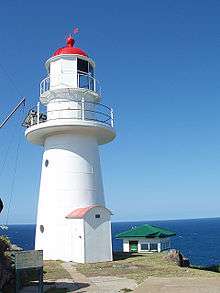New Burnett Heads Light
 Queensland | |
| Location |
Burnett Heads Queensland Australia |
|---|---|
| Coordinates | 24°45′29.5″S 152°24′45.7″E / 24.758194°S 152.412694°ECoordinates: 24°45′29.5″S 152°24′45.7″E / 24.758194°S 152.412694°E |
| Year first constructed | 1971 |
| Automated | 1971 |
| Construction | concrete tower |
| Tower shape | octagonal prism tower with no balcony and no lantern |
| Markings / pattern | white tower with a horizontal red band around the top |
| Height | 65 feet (20 m) |
| Focal height | 59 feet (18 m) |
| Original lens | fifth order Fresnel lens |
| Light source | mains power |
| Intensity | 55,000 cd |
| Range | 18 nautical miles (33 km; 21 mi)[1] |
| Characteristic | Fl (4) W 20s. |
| Admiralty number | K2956 |
| NGA number | 111-10476 |
| ARLHS number | AUS-197 |
| Managing agent | Australian Maritime Safety Authority |
The New Burnett Heads Light, also known as South Head Light, is an active lighthouse standing on the south side of the Burnett River entrance, in Burnett Heads, Queensland, Australia. In 1971 it replaced the Old Burnett Heads Light, which was relocated inland.
History
The Old Burnett Heads Light stood on the south side of the Burnett River entrance between 1873 and 1971, when it was replaced with this tower.[2] The new lighthouse was the fourth of a group of seven concrete towers erected by the Commonwealth between 1964 and 1979, by order of construction, Cape Capricorn Light, New Caloundra Light, Point Danger Light, itself, Fitzroy Island Light, Point Cartwright Light and Archer Point Light.[3] The tower is made of concrete and covered with tiles, in the "swimming pool" style,[4] much like Point Cartwright Light and Fitzroy Island Light.[5] The concrete base of the old lighthouse is still present next to the new tower.[2] The lighthouse also carries a Cospas-Sarsat receiver, one of a pair in Australia, the second being at Cave Point Light, Western Australia.[2]
Light specifications
The light characteristic shown is four white flashes every twenty seconds Fl.(4)W. 20s, only visible in the sector 120°-320°.[6] The light source is a 12 Volt 50 Watt tungsten-halogen lamp, fed from the Mains electricity, providing a light intensity of 55,000 cd,[7] visible for 18 nautical miles (33 km; 21 mi).[1]
Site operation and visiting
The site and the lighthouse are manages by the Australian Maritime Safety Authority. The site is open, but the tower is closed to the public.[2]
See also
Notes
- 1 2 List of Lights. Lighthouses of Australia Inc lists 13 nautical miles (24 km; 15 mi).
- 1 2 3 4 Rowlett.
- ↑ CHIMS31351.
- ↑ Flotwell 2003.
- ↑ Ibbotson 2000.
- ↑ List of Lights
- ↑ Lighthouses of Australia Inc.
References
- List of Lights, Pub. 111, The West Coasts of North and South America (Excluding Continental U.S.A. and Hawaii), Australia, Tasmania, New Zealand, and the Islands of the North and South Pacific Oceans (PDF). List of Lights. United States National Geospatial-Intelligence Agency. 2009. p. 208.
- Rowlett, Russ. "Lighthouses of Australia: Queensland's East Coast". The Lighthouse Directory. University of North Carolina at Chapel Hill. Retrieved 14 November 2010.
- "The New Burnett Heads Lighthouse". Lighthouses of Queensland. Lighthouses of Australia Inc.
- Flotwell, Annette (August 2003). "Annette Flotwell's East Coast Lighthouse Trip: Part 2". Lighthouses of Australia Inc Bulletin (4).
- Ibbotson, John (November 2000). "Around Australia Chasing Lighthouses". Lighthouses of Australia Inc Bulletin (11).
- "Caloundra Lighthouses (entry 602746)". Queensland Heritage Register. Queensland Heritage Council. Retrieved 13 July 2015.
External links
- Hurburgh, David (March 2002). "Lighthouses From the Air: Part 7". Lighthouses of Australia Inc Bulletin. 5 (3).
- Picture of New Burnett Heads Light
